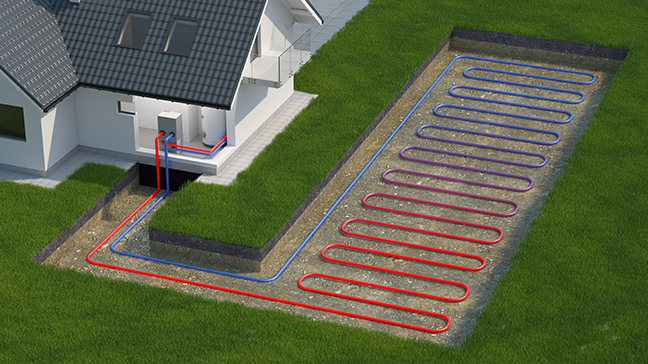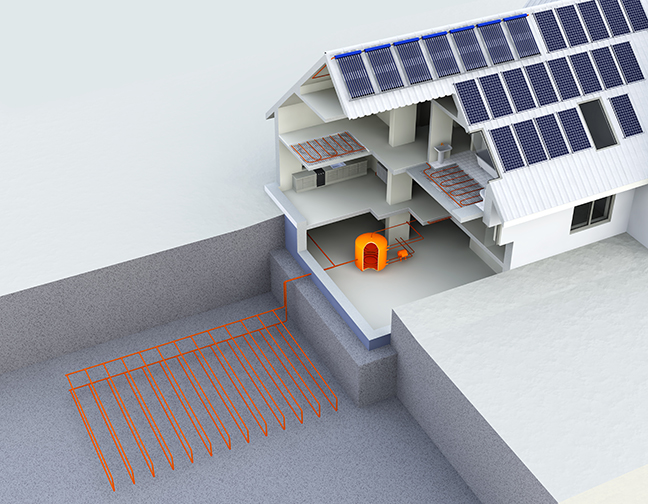Ground source (geothermal) heat pumps extract heat from the ground during cold weather and distribute it throughout your property. During warmer months, this process is reversed to provide cooling. This system is the most efficient type of heat pump and can offer around 50 percent savings* on heating and cooling costs when compared to a conventional fossil fuel system.** These heat pumps are a great option for properties with sufficient outdoor space to accommodate the system.
Benefits
- Environmental impact: Emit zero greenhouse gases when pairing with a 100% renewable energy source
- Comfort: Get all-in-one heating, cooling, and dehumidification
- Convenience: Maintain consistent indoor temperature and humidity levels
- Maintenance: Lower your maintenance costs compared to other heating and cooling systems
- Efficiency: Up to 400% efficient—for every 1 unit of energy used to power a heat pump, up to 4 units of heat energy are supplied
- Cost: Lower your energy bills compared to other heating options***
*https://igshpa.org/about-geothermal/
**A heat pump is an electrical system, so running one will add to your electrical use. In many cases, that additional electrical use is offset by savings elsewhere, such as a propane or oil heating fuel bill. Of course, if you’re adding a heat pump where there was no cooling source before, it will increase your electric use.
***Significant savings may not be realized when switching from natural gas.
Incentives & Financing
Single Family
INCENTIVES
Rebates up to $1,500 per ton for qualifying ground source heat pumps
Federal tax credits may be available. Learn more about the IRA tax credits here or speak to your tax preparer.
FINANCING
Multifamily
INCENTIVES
Incentive up to $4,000 per ton for qualifying ground source heat pumps
FINANCING
Commercial
INCENTIVES
Energy Optimization Incentive: Up to $4,000 per ton combined incentives for qualifying models
FINANCING
Information & Tips
An ENERGY STAR certified ground source heat pump is a low-maintenance and environmentally friendly heating and cooling option for your property. Because it’s mechanically simple and all its outdoor equipment is below ground, where it’s protected from the weather, your maintenance costs are often lower than other heating and cooling systems.
Efficiency First: Before installing a heat pump, weatherize your home to enhance comfort, reduce energy use and greenhouse gas emissions, and improve equipment efficiency and lifespan.

Ground source heat pump systems have three main parts: a closed loop, which circulates fluid through an underground field in vertical and/or horizontal trenches; single or multiple pumps, fans, and compressors that provide heating and cooling; and a distribution system, typically ductwork, that carries air throughout your home or business to maintain an even temperature.
To pick the right heat pump for your home or business, consult with a qualified contractor that participates in the Energize CT Heat Pump Installer Network. If you find a system that meets our minimum efficiency criteria, claim your rebate once the installation is complete.
Compare the annual cost and carbon emissions savings from investing in a new heating and cooling system. The Clean Heating & Cooling Calculator can help you see how much upgrading your system to a heat pump would reduce your carbon emissions – and what it would mean for your home’s budget.
ENERGY STAR is the government-backed symbol for energy efficiency, providing credible, unbiased information that you can rely on to make well-informed decisions. The Environmental Protection Agency (EPA) ensures that each product that earns the ENERGY STAR label is independently certified to deliver efficiency, performance, and savings.
How Ground Source Heat Pumps Work
A ground source heat pump uses the earth’s constant temperature to provide efficient heating and cooling. In the winter, fluid circulating in underground pipes carries the heat to your home or business, and in the summer, the process is reversed so heat from your home or business is carried back to the earth to provide cooling.
Ground Source Heat Pump Case Studies
Multi promo responsive title
-
Holton Family - Residential Case Study
Read the story of why the Holton Family chose to install a ground source heat pump at their home in New Milford, Connecticut.
![]()
-
Spence Family - Residential Case Study
See why the Spence family turned to geothermal heat pumps as a heating and cooling soution for their 2,400 sqare foot home in Bethel, Connecticut.
![]()
Other Helpful Resources
Other Helpful Resources
-
Learn more about heat pumps
Download the heat pump brochure.
![]()
-
Heat pump user tips
Get the most from your heat pump.
![]()
-
Explore Clean Heating and Cooling Technologies
Learn more about the full range of clean heating and cooling technologies and how they can increase your home's efficiency and sustainability by exploring our comprehensive overview.
![]()
Also Explore ➞
Home & Business Energy Assessments
- Request an energy performance assessment of your home or business
- Receive customized energy-saving recommendations
- Get help implementing energy-saving measures from a technician or receive rebates and incentives to implement them yourself










